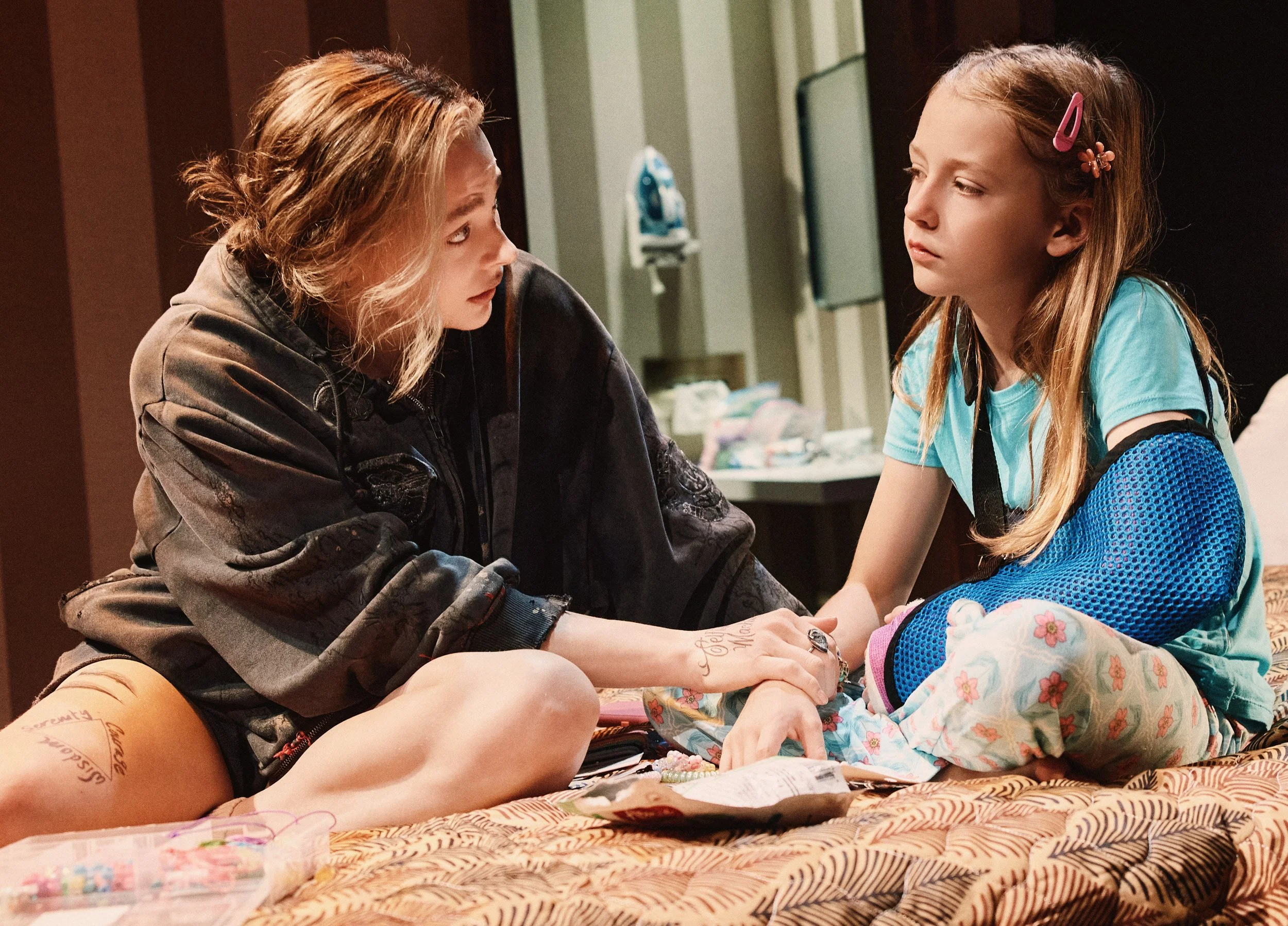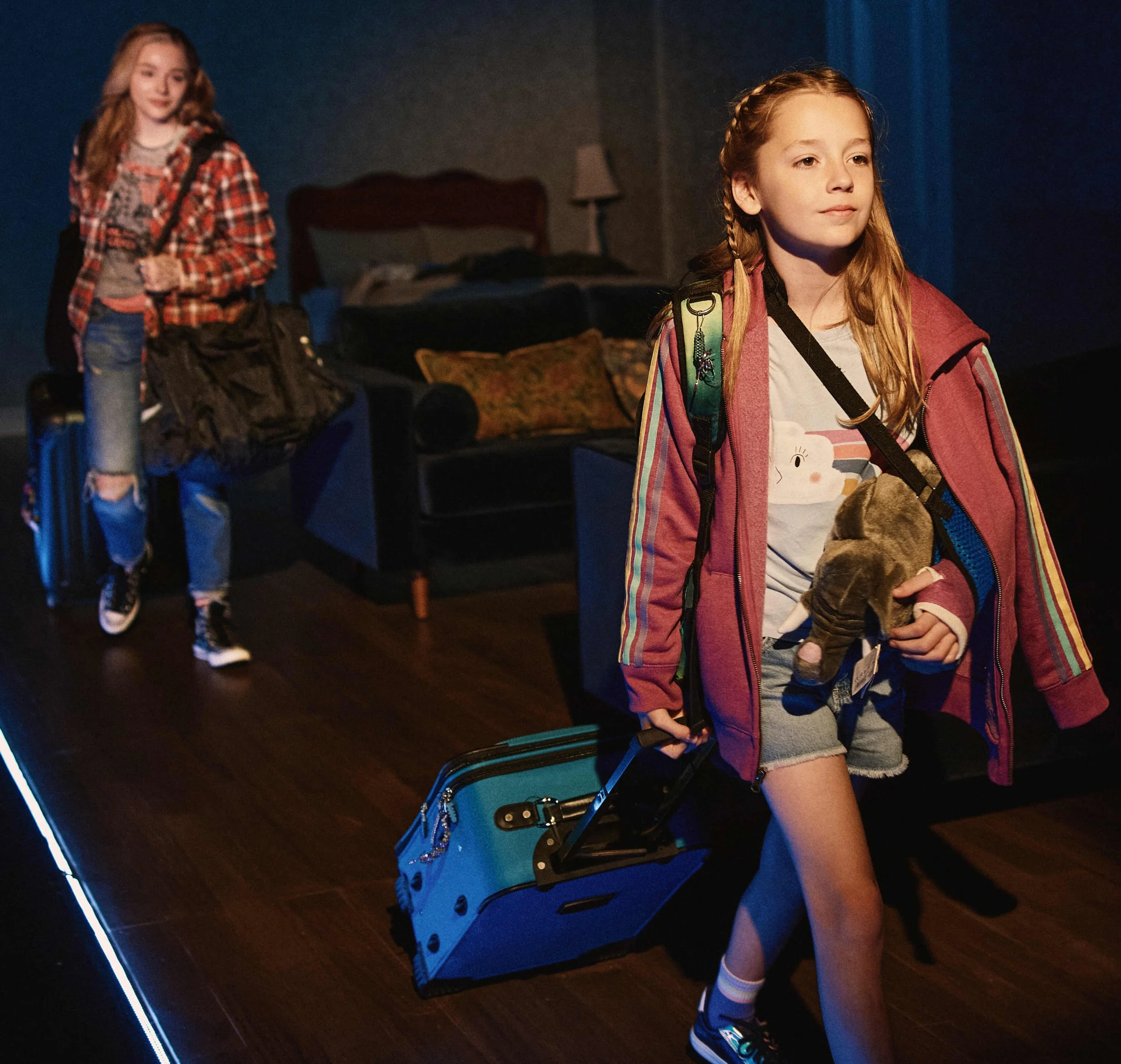“If something seems even a little bit wrong, we’ll go,” Maddie (Chloë Grace Moretz, left) promises her trans daughter, Caroline (River Lipe-Smith), on their way to meet Maddie’s parents.
“You don’t need to be better. I like how you are.” In a story about a trans child, this line is something one might hear from the parents of that child, as they learn to adjust and accept. But in Caroline, trans playwright Preston Max Allen defies expectations for a story about a trans child. It is the trans child in Caroline who speaks this line to her mother, an eight-years-sober alcoholic talking about her recovery.
Caroline (Lipe-Smith, right) and her mom (Moretz) hit the road in Preston Max Allen’s Caroline at MCC Theater.
That line coming from Caroline’s title character epitomizes the loving, devoted relationship between mother and child that is beautifully rendered in the performances of Chloë Grace Moretz (a child star herself not so long ago) and River Lipe-Smith, the trans actor who plays 9-year-old Caroline.
The third member of the cast is Amy Landecker, a costar of the streaming series Transparent—also about the family of a person who has recently transitioned. Landecker portrays Caroline’s grandmother Rhea, who isn’t even aware of her grandchild’s existence until the kid and her mother, Maddie, Rhea’s estranged daughter, show up on her doorstep in the Chicago suburbs, on the run from Maddie’s violent boyfriend—and from the anti-trans laws of West Virginia, where they’d been living.
Rhea takes to Caroline immediately and, like Maddie, fully supports the child. The problem in this family is between Rhea and Maddie, who became addicted in her teens and repeatedly stole from her parents, including the last time they welcomed her back after a period of estrangement.
Now Maddie is hoping her affluent parents will provide the money and assistance to get Caroline the medical care and protection she needs. Rhea acknowledges the progress Maddie has made in the decade since she last saw her daughter—“You’ve achieved a lot of wonderful things for yourself, and I’m proud of you”—but she cannot forgive or trust her daughter, and Rhea’s inability (or refusal) to stop punishing Maddie could keep her from helping her granddaughter.
“Lipe-Smith and Moretz create a wonderful rapport. ”
Directed by David Cromer, this gentle, grounded 90-minute drama can be a pleasure to watch, yet it doesn’t contain much dramatic tension. Save for one blowout fight between Rhea and Maddie toward the end, the tone of most scenes is tender and tranquil. In its plainspokenness, Caroline feels like a cross between a drawing room play and a kitchen-sink drama—the former because its set centers on a stylish living room in an upper-class home; the latter because of the play’s social issues, unadorned storytelling and financially struggling main character (though in Rhea’s immaculate kitchen, where the appliances are hidden behind cabinet doors, you don’t even see the sink).
Caroline’s script also leaves a number of ideas unexplored. When Caroline inquires what Maddie was like when she was younger, Rhea responds, “I’m not really sure. I didn’t know her very well before she got sick.” Landecker delivers this line with a wistfulness that suggests she’s realizing, regretfully, something about her parenting. And it seems to stay on Rhea’s mind, as she later asks Maddie, “I took you out, right? We did fun things together?”
Rhea (Amy Landecker, right) gets to know her grandchild, Caroline (Lipe-Smith). Photos by Emilio Madrid.
But Maddie’s assertion in a subsequent scene that Rhea sees Caroline as her “second chance” at parenthood comes amid a barrage of angry recriminations between the women. So Rhea’s epiphany goes unfulfilled, and neither the characters nor the audience get at the truth about how helpful, or culpable, Rhea was in Maddie’s addiction. And she unambiguously turns into the villain with an ultimatum she gives Maddie regarding Caroline’s care.
Caroline’s and Maddie’s personalities and life stories are vividly drawn by the script and performances; Rhea’s characterization, on the contrary, notably lacks details—about her marriage, the source of her wealth, her mindset regarding anything other than her daughter’s troubles. This leaves Landecker mostly acting hesitant (with Caroline) or pained (with Maddie), and she clutches her sweater around her torso too much.
Lipe-Smith and Moretz, meanwhile, create a wonderful rapport, and both capture a range of qualities in their characters—from fear to savvy to sass for Caroline; tremulous yet determined and eventually heartbreaking for Maddie. Just having Lipe-Smith onstage feels enlightening, but the experience of getting to know Caroline is enhanced by the 11-year-old’s assured acting. While Caroline may be wise beyond her years, her dialogue still sounds like it comes from a child—not from the college-educated adult who penned the words (a common pitfall in writing smart-kid characters).
Caroline offers a simply told story of dealing with challenges as a parent. This simplicity precludes any grand themes or subtext, but sensitive performances give the play emotional power.
Caroline runs through Nov. 2 at the Robert W. Wilson MCC Theater Space (511 W. 52nd St.). Performances are at 7 p.m. Tuesday through Saturday and 6 p.m. on Sunday, with matinees at 2 p.m. Thursday and Saturday and 1 p.m. Sunday. For tickets and more information, visit mcctheater.org.
Playwright: Preston Max Allen
Director: David Cromer
Sets: Lee Jellinek
Costumes: David Hyman
Lighting: Tyler Micoleau
Sound: Christopher Darbassie





